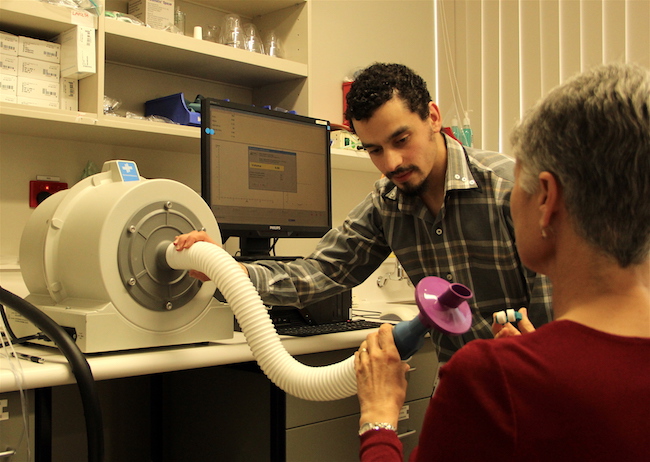Overview
We investigate respiratory disease and its treatment at our research unit based in Dunedin Hospital. Our skilled and experienced staff are involved in academic studies and pharmaceutical clinical trials across a range of respiratory diseases, and we have research opportunities for both undergraduate and postgraduate students.
Research
The Otago Respiratory Research Unit is best known for work on exhaled nitric oxide as a biomarker in asthma and other airway diseases. Our group has produced some of the leading research on exhaled nitric oxide, and we continue to work and publish in this field.
Other research interests include several collaborations across Otago Medical School and beyond. Working with colleagues in the Department of Biochemistry, we are investigating gene expression in antibiotic-resistant bacteria in patients with cystic fibrosis. We are collaborating with colleagues in the Department of General Practice and Rural Health to explore how best to deliver health care for patients with severe chronic obstructive pulmonary disease (COPD). Working with colleagues in the School of Pharmacy, we are investigating inhaled antibiotic therapy for tuberculosis. We are also working with colleagues in the Pharmacoepidemiology Research Network on the use and safety of medications in patients with COPD.
Our unit is also involved in commercial pharmaceutical studies. In recent years, we have undertaken studies in asthma, COPD, bronchiectasis, cystic fibrosis, and interstitial lung disease.
Research opportunities for students
Three PhD students and three BMedSc students have studied with us in the last fifteen years, and we have provided several summer studentships. We welcome further enquiries for postgraduate and undergraduate study, and summer studentships.

Staff in the Otago Respiratory Research Unit

From left: Jan Cowan, Ben Brockway, Jo Wass, Jack Dummer.
- Jan CowanResearch Manager
- Dr Ben BrockwayConsultant and Senior Lecturer in Respiratory Medicine
- Jo Wass Research Nurse
- Dr Jack DummerConsultant and Senior Lecturer in Respiratory Medicine
- Emeritus Professor Robin Taylor Emeritus Professor in Respiratory Medicine
Select publications
- Dummer, J., Dobler, C. C., Holmes, M., Chambers, D., Yang, I. A., Parkin, L., … Holland, A. E. (2020). Diagnosis and treatment of lung disease associated with alpha one-antitrypsin deficiency: A position statement from the Thoracic Society of Australia and New Zealand. Respirology. Advance online publication. doi: 10.1111/resp.13774
- Beckert, L., Brockway, B., Simpson, G., Southcott, A. M., Lee, Y. C. G., Rahman, N., … Idell, S. (2019). Phase I trial of the single-chain urokinase intrapleural LTI-01 in complicated parapneumonic effusions or empyema. JCI Insight, 4(10), e127470. doi: 10.1172/jci.insight.127470
- Parkin, L., Quon, J., Sharples, K., Barson, D., & Dummer, J. (2019). Underuse of beta-blockers by patients with COPD and co-morbid acute coronary syndrome: A nationwide follow-up study in New Zealand. Respirology. Advance online publication. doi: 10.1111/resp.13662
- Stokes, T., Tumilty, E., Tiatia Fa'atoese Latu, A., Doolan-Noble, F., Baxter, J., McAuley, K., … Dummer, J. (2019). Improving access to health care for people with severe chronic obstructive pulmonary disease (COPD) in southern New Zealand: Qualitative study of the views of health professional stakeholders and patients. BMJ Open, 9, e033524. doi: 10.1136/bmjopen-2019-033524
- Amer, M., Cowan, J., Gray, A., Brockway, B., & Dummer, J. (2016). Effect of inhaled β2-agonist on exhaled nitric oxide in chronic obstructive pulmonary disease. PLoS ONE, 11(6), e0157019. doi: 10.1371/journal.pone.0157019
- Dummer, J. F., Epton, M. J., Cowan, J. O., Cook, J. M., Condliffe, R., Landhuis, C. E., Smith, A. D., & Taylor, D. R. (2009). Predicting corticosteroid response in chronic obstructive pulmonary disease using exhaled nitric oxide. American Journal of Respiratory & Critical Care Medicine, 180(9), 846-852. doi: 10.1164/rccm.200905-0685OC